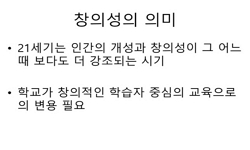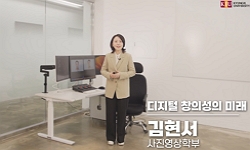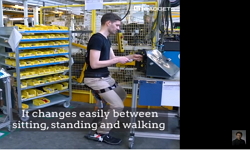본 연구는 만 4~6세 유아를 대상으로 유아의 창의적 성격특성(권위의 수용, 자신감, 탐구심, 타인에 대한 인식, 적극적인 상상력)과 그림 창의성과의 관계를 알아봄으로써 성격특성에 적절한 ...
http://chineseinput.net/에서 pinyin(병음)방식으로 중국어를 변환할 수 있습니다.
변환된 중국어를 복사하여 사용하시면 됩니다.
- 中文 을 입력하시려면 zhongwen을 입력하시고 space를누르시면됩니다.
- 北京 을 입력하시려면 beijing을 입력하시고 space를 누르시면 됩니다.
https://www.riss.kr/link?id=T10009790
- 저자
-
발행사항
대구: 계명대학교, 2004
-
학위논문사항
학위논문(석사) -- 계명대학교 유아교육대학원 , 유아영재교육학과 , 2005.2
-
발행연도
2004
-
작성언어
한국어
- 주제어
-
DDC
372.2
-
발행국(도시)
대구
-
형태사항
ⅳ, 42p: 삽도; 27cm.
-
일반주기명
지도교수: 유연옥
- 소장기관
-
0
상세조회 -
0
다운로드
부가정보
국문 초록 (Abstract)
본 연구의 대상은 대구시에 위치한 어린이집, 유치원, 초등학교에 재원중인 만4세~만6세 유아 만4세 (남30, 여30), 만5세 (남30, 여30), 만6세 (남40, 여20), 총 180명을 대상으로 하였다. 프로그램 적용기간은 2003년 12월 1일부터 2004년 2월 20까지 실시되었다.
본 연구에서 사용한 검사도구는 유아의 창의적 성격특성을 진단하기 위하여 김영채(2002)가 표준화한 창의적 성격검사 "당신은 어떤 사람인가?"와 유아의 창의성을 측정하기 위하여 Jellen과 Urban(1986)에 의해 제작된 그림창의성 검사(TCT-DP: Test for Creative Thinking - Drawing Production)를 사용하였다.
이에 따른 자료 분석은 유아의 창의성의 발달과정을 규명하기 위하여 창의적 성격검사와 그림창의성검사(TCT-DP)의 산출물을 평균, 표준편차, ANOVA, Pearson 적률상관계수로 분석하였다.
본 연구의 결과와 논의를 토대로 얻어진 결론은 다음과 같다.
첫째, 4세에서 6세까지 유아의 각 연령별 창의적 성격 특성은 차이가 없는 것으로 나타났다.
둘째, 각 연령별 창의성에서는 4세, 5세 6세 순으로 꾸준한 증가를 보이고 있는 것으로 나타났다.
셋째, 창의적 성격특성과 창의성간의 차이에서는, 창의성 점수가 높은 유아일수록 자신감이나 탐구심, 상상력이 뛰어나며, 타인에 대한 의식이나 권위에 대한 수용은 낮은 것으로 나타났다.
본 연구는 만 4~6세 유아를 대상으로 유아의 창의적 성격특성(권위의 수용, 자신감, 탐구심, 타인에 대한 인식, 적극적인 상상력)과 그림 창의성과의 관계를 알아봄으로써 성격특성에 적절한 교수방법을 적용하고, 각 연령별 창의적 성격 특성에 맞는 창의성 프로그램 계발의 기초 자료로서 활용하고자 하는 것이다. 이러한 연구목적을 위하여 본 연구에서는 다음과 같은 연구문제를 설정하였다. 유아의 창의적 성격특성은 연령에 따라 차이가 있는가?, 유아의 그림창의성은 연령에 따라 차이가 있는가?, 유아의 창의적 성격특성과 그림 창의성의 관계는 어떠한가?
본 연구의 대상은 대구시에 위치한 어린이집, 유치원, 초등학교에 재원중인 만4세~만6세 유아 만4세 (남30, 여30), 만5세 (남30, 여30), 만6세 (남40, 여20), 총 180명을 대상으로 하였다. 프로그램 적용기간은 2003년 12월 1일부터 2004년 2월 20까지 실시되었다.
본 연구에서 사용한 검사도구는 유아의 창의적 성격특성을 진단하기 위하여 김영채(2002)가 표준화한 창의적 성격검사 "당신은 어떤 사람인가?"와 유아의 창의성을 측정하기 위하여 Jellen과 Urban(1986)에 의해 제작된 그림창의성 검사(TCT-DP: Test for Creative Thinking - Drawing Production)를 사용하였다.
이에 따른 자료 분석은 유아의 창의성의 발달과정을 규명하기 위하여 창의적 성격검사와 그림창의성검사(TCT-DP)의 산출물을 평균, 표준편차, ANOVA, Pearson 적률상관계수로 분석하였다.
본 연구의 결과와 논의를 토대로 얻어진 결론은 다음과 같다.
첫째, 4세에서 6세까지 유아의 각 연령별 창의적 성격 특성은 차이가 없는 것으로 나타났다.
둘째, 각 연령별 창의성에서는 4세, 5세 6세 순으로 꾸준한 증가를 보이고 있는 것으로 나타났다.
셋째, 창의적 성격특성과 창의성간의 차이에서는, 창의성 점수가 높은 유아일수록 자신감이나 탐구심, 상상력이 뛰어나며, 타인에 대한 의식이나 권위에 대한 수용은 낮은 것으로 나타났다.
다국어 초록 (Multilingual Abstract)
The subject of this research were 180, 4~6 years old, young children who was attending to day cares, preschools, elementary schools. Age 4 (M:30, F:30), Age 5 (M:30, F:30), Age 6. This research were carried out from December, 2003 to February, 2004.
In this research, "What kind of person are you?" - the creative characteristic test which was standardized by Kim, Young-chea(2002) - for examining the young child's creative characteristic features and “TCT-DP(Test for Creative Thinking-Drawing Production)” - which was made by Jellen & Urban (1986) - for measuring the young child's creativity are used.
Analyzing data were made of average, standard deviatim, ANOVA, correlation which were the output of the creative characteristic test and TCT-DT to find out young child's development of creativity.
The results and conclusions which was based on this research are belows.
First, there was no difference of creative personality characteristic in the age of 4~6.
Second, in the each different age, it showed that the creativity seems to increase steadily ordering the age of 4, 5, 6.
Third, in the difference between creative personality characteristic and creativity, the young children who had the high scores of creativity were excellent in the characteristic features of confidence, observation, and imagination. But they were low in its cognition and authority about others.
This research was aimed to apply the suitable instruction by knowing the relation between the young child's creative personality characteristic (the acceptance of authority, confidence, observation, cognition of others, positive imagination) and the d...
This research was aimed to apply the suitable instruction by knowing the relation between the young child's creative personality characteristic (the acceptance of authority, confidence, observation, cognition of others, positive imagination) and the drawing creativity, and to utilize in the basic materials of the development creative program which can fit in the each age's creative personality characteristic, in the subject of age 4~6 young child. For the goal of this research, this research sets up the research questions like the followings. First Is there any difference of young child's creative personality characteristic along the age? Second Is there any difference of young child's drawing creativity along the age? Third How is the relation between young child's creative personality characteristic and drawing creativity?
The subject of this research were 180, 4~6 years old, young children who was attending to day cares, preschools, elementary schools. Age 4 (M:30, F:30), Age 5 (M:30, F:30), Age 6. This research were carried out from December, 2003 to February, 2004.
In this research, "What kind of person are you?" - the creative characteristic test which was standardized by Kim, Young-chea(2002) - for examining the young child's creative characteristic features and “TCT-DP(Test for Creative Thinking-Drawing Production)” - which was made by Jellen & Urban (1986) - for measuring the young child's creativity are used.
Analyzing data were made of average, standard deviatim, ANOVA, correlation which were the output of the creative characteristic test and TCT-DT to find out young child's development of creativity.
The results and conclusions which was based on this research are belows.
First, there was no difference of creative personality characteristic in the age of 4~6.
Second, in the each different age, it showed that the creativity seems to increase steadily ordering the age of 4, 5, 6.
Third, in the difference between creative personality characteristic and creativity, the young children who had the high scores of creativity were excellent in the characteristic features of confidence, observation, and imagination. But they were low in its cognition and authority about others.
목차 (Table of Contents)
- 목차
- Ⅰ. 서론 = 1
- 1. 연구의 필요성 및 목적 = 1
- 2. 연구문제 = 3
- Ⅱ. 이론적 배경 = 4
- 목차
- Ⅰ. 서론 = 1
- 1. 연구의 필요성 및 목적 = 1
- 2. 연구문제 = 3
- Ⅱ. 이론적 배경 = 4
- 1. 창의적 성격특성 = 4
- 2. 창의성 = 7
- 3. 창의적 성격특성과 창의성 관련 선행연구 = 16
- 4. 그림창의성 = 17
- Ⅲ. 연구방법 = 20
- 1. 연구대상 = 20
- 2. 연구도구 = 20
- 3. 연구절차 = 23
- 4. 분석 방법 = 24
- Ⅳ. 연구결과 = 25
- 1. 창의적 성격특성 = 25
- 2. 그림창의성 = 27
- 3. 창의적 성격특성과 그림창의성과의 관계 = 31
- Ⅴ. 논의 = 33
- 참고문헌 = 36
- Abstract = 39
- 초록 = 41












